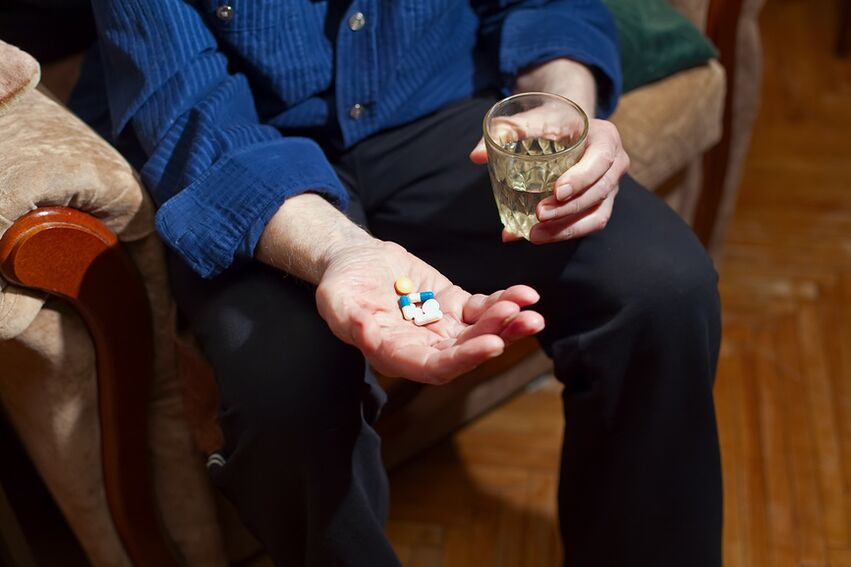
What is chronic prostatitis?
- Chronic bacterial prostatitis.Pain symptoms either completely subside or suddenly return. Even at its peak, inflammation does not reach the intensity of acute prostatitis. Irritation of the prostate is caused by a third party - pathogenic bacteria. This type of prostatitis disappears without diagnosis and comprehensive treatment: for example, if a person suffers from a cold or seasonal illness at the same time as the inflammation. Antibiotics inhibit the activity of bacterial colonies and the disease subsides. But the next time your immune system fails, chronic prostatitis will return, and you'll have to get treatment.
- Chronic nonbacterial prostatitis.Research shows that chronic nonbacterial prostatitis remains one of the most common conditions in men under 50 years of age. The disease usually begins with a bacterial invasion: bacteria become active in the context of weakened immunity and are defeated. The result is a depletion of the body's resources, which is why inflammation returns in the future without bacterial involvement. Nonbacterial chronic prostatitis is characterized by long duration, short remission periods, and barely noticeable symptoms. Men with nonbacterial prostatitis may become convinced that the disease is getting worse. The burning sensation is more intense than in the bacterial form, since this disease does not allow you to relax and temporarily escape the pain. Treatment is minimally invasive. Nonbacterial advanced chronic prostatitis is treated in the surgeon's office.
- Chronic asymptomatic (no symptoms) prostatitis.This form of prostatitis is not painful for men, but it can be dangerous as a hidden threat. Asymptomatic prostatitis has no obvious symptoms. Prostatic burning, itching, moisture release, and other signs of inflammation do not occur. At the same time, the inflammatory process affects reproductive function, which is why men may think they are infertile. Chronic asymptomatic prostatitis can only be detected through laboratory diagnosis. Tests will show increased bacterial activity, which is associated with the development of prostatitis in men. Combined with the release of white blood cells during urination, this will aid in diagnosis. Please note: Annual preventive exams with your urologist may not be enough. Asymptomatic chronic prostatitis also has active phases, making it difficult to diagnose.
- Chronic granulomatous prostatitis.The rarest form of the disease occurs as a side effect of medications for other illnesses or long-term radiation. In this case, the inflammatory process is only a secondary symptom. The pain is associated with the progressive destruction of prostate tissue, which is replaced by connective tissue. Degeneration of this organ can cause prostate function to diminish until it ceases completely. If left untreated, the process becomes irreversible.
reason
- Sexually transmitted infections.They directly affect the prostate or weaken the immune system, so that the slightest irritation can trigger an inflammatory process. The infection is sexually transmitted through unprotected contact. Carriers may not know they are infected: some infections occur only in men, although they are carried by women, and vice versa. The best preventive measure is hygienic contraceptives. Urologists recommend using condoms even during non-penetrative intercourse, such as during prostate stimulation.
- Passive lifestyle.Lack of physical activity can lead to chronic circulatory problems not only in the prostate, but also in the entire pelvic area. If you have to spend most of your day at a desk, don’t forget to stand up and stretch at least every 1-2 hours. Mild exercise, a walk in the office, or stretching will restore normal blood circulation. On the weekends, you can compensate for the workload of the work week with long walks or physical activities.
- Incomplete sexual intercourse, artificially prolonged sexual excitement, or prolonged abstinence.The male reproductive system needs to be drained regularly. This is how sperm are renewed, so that all organs are permanently prepared for the reproductive process. What happens if a man regularly delays or prevents himself from reaching orgasm? The body accumulates more sperm and by-products than it needs. The prostate is also affected: it produces unnecessary secretions that have nowhere to be directed. If this situation keeps repeating, the result may be chronic prostatitis.
- Periodic hypothermia.It is believed that complete freezing is good for men - it strengthens the body. In fact, men who get hypothermia while walking, riding a motorcycle, or skiing can overload their immune systems. The body has a harder time coping with bacterial activity, and the vulnerability of the prostate increases exponentially. In this case, it is easy to become a carrier of bacterial prostatitis and then transform into a non-bacterial or asymptomatic form.
- Chronic lack of sleep, depression, stress.Psychological factors combined with fatigue can weaken the immune system and predispose the body to a range of chronic diseases. Men who do not get enough rest at night or are stressed after work are 2-3 times more likely to suffer from prostatitis than men who sleep 8-10 hours a day and get enough rest with their families. In the early stages of the disease, it is important not to blame yourself and not to give in to pessimistic thoughts: they will only make the disease worse. See a doctor immediately - you will get rid of unpleasant symptoms, if not the disease itself.
- Disturbances in hormonal activity.In chronic prostatitis, the function of the prostate is impaired. Hormones are responsible for regulating the prostate and coordinating the functions of the secretory and reproductive systems. Even minor hormonal imbalances can cause inflammation. In this case, treatment of chronic prostatitis must be supplemented with hormonal therapy.
- Ignore personal hygiene rules. Caution: One application is enough for bacteria to settle on the tissue. You may not notice the consequences of years of not following your personal care rules, and your immune system protects your body from bacterial invasion. But one exacerbation of the seasonal disease is enough to introduce chronic prostatitis problems into a man's life for months.
How to treat chronic prostatitis in men and what to do
medical treatement

Surgical methods
Minimally invasive treatment methods
- Exposure to ultrasound.Prostatitis only affects the prostate, so UV treatment focuses the radiation on that organ. Regular treatments can reduce symptoms, reduce swelling and pain. The procedure is painless, causes no irritation and is harmless to the genitourinary system.
- heat treatment.Prostatitis and its manifestations can be reduced to "none" through microwave heat therapy. The high temperature acts directly on the prostate, causing it to shrink. This method is not used if prostatitis has entered the acute stage: in this case, heating will worsen the condition.
- Freezing damage.Painless partial removal of inflamed glandular tissue using liquid nitrogen with minimal recovery time. If antimicrobial treatment is combined with strengthening the immune system, chronic prostatitis disappears completely. Reproductive function is not affected, and the possibility of recurrence of prostatitis is very small.
- Induction therapy.A combination of laser and magnetic fields can normalize blood circulation, trigger regenerative processes and relieve pain caused by inflammation. This technology has an auxiliary effect in prostatitis: induction therapy can increase the effectiveness of drugs by one and a half to two times, but without the use of drugs, it can only produce short-term effects.
- laser processing.If chronic prostatitis is associated with long-term exacerbation, laser treatment is indicated. The laser evaporates excess water, blocking the growth areas of tissue damage caused by prostatitis. The treatment has a stimulating effect: the body's cells are activated, natural defenses are awakened and tissue regeneration occurs.























